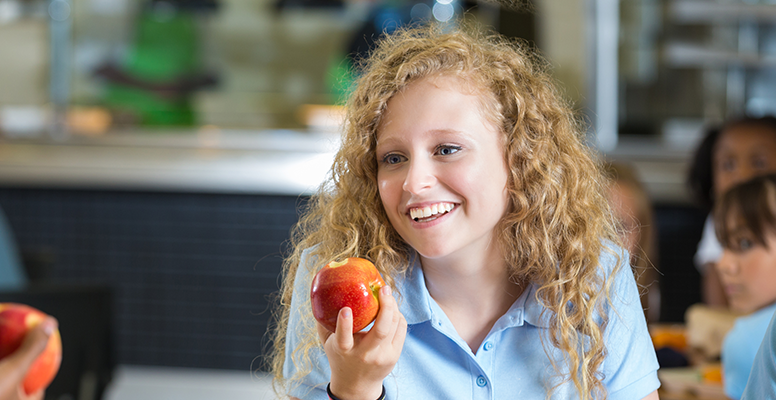9th May 2022
How can we maximise social and economic value from universal free school meals?
By the end of 2024, every primary school pupil across Scotland and Wales will enjoy a free school meal under plans announced by the governments of each nation. Civica’s Dawn Pollard, Managing Director, Cashless Solutions, explores the vital role that data-driven digital technologies will play in ensuring these landmark schemes deliver the widest possible social and economic benefits.
For the Scottish Government, the roll out of Universal Free School Meals (UFSM) represents a crucial milestone on the nation’s journey of becoming a ‘Good Food Nation’, an initiative soon to be enshrined in legislation. In Wales, a commitment to free school meals for all primary school children is a central policy plank of the Co-operation Agreement agreed between Labour and Plaid Cymru following last May’s Senedd elections. The scheme was kick-started last month, with a £25m investment announced by First Minister Mark Drakeford. Whilst the timing and approach in each nation may vary, the outcome will be the same; thousands of schools providing millions of meals to children at no cost to parents. The schemes will no doubt be warmly welcomed by parents – particularly those on lower incomes. Success, however, will hinge on a myriad of factors, from social, to environmental to financial.
The basic ingredients
Delivering Universal Free School Meals will be a complex task. It will require a lot of cooks in the kitchen – and not just in the culinary sense. With a broad range of stakeholders, from councils to schools to parents and huge investment required from government, it is vital that UFSM schemes are built on a solid foundation, backed by data-driven digital technologies.
From order stock to measuring social impact, data will fuel smarter decision-making at every level, ensuring that UFSM delivers the widest possible range of social and economic benefits that both the Scottish and Welsh governments aspire towards. Crucially, data will ensure that governments can monitor and measure the impact of the schemes and ensure the highest standards of transparency and governance.
Proof is in the (digital) pudding
Leaders in both Cardiff and Edinburgh have placed a great deal of emphasis on the social and economic benefits they aim to deliver through Universal Free School Meals. From ensuring no child goes hungry to improving their overall learning outcomes, their goals are clear. But measuring the true impact of free meals will require high quality, reliable data which is easily accessible and where appropriate - publicly available.
Our Civica Cashless Catering solution, already used in 1,500 schools around the UK, can provide the vital insights needed to measure success and – crucially – help shape the future direction of the schemes. These insights could range from measuring how many more children are receiving meals because of UFSM, recording how many pupils are opting for healthier choices and understanding any longer-term causal trends such as improving pupil behaviour.
Making every crumb count
With every free school meal, comes the potential for food waste and the environmental consequences associated with it. Key drivers for food waste in our schools range from inefficient stock ordering to menu choices which don’t cater for the needs and diets of individual pupils. Our Civica Catering Management solution, already used by in 17,000 locations globally, enables smarter stock management and even allows catering managers to model the impact of changing portion sizes, replacing ingredients and changing the menu options. Armed with this data, schools and parents can work together make sure that waste is kept to an absolute minimum.
Earlier this year, we were excited to announce a brand new Saffron feature which will allow catering providers to easily calculate and report on CO2 values for their foodservice recipes and menus. Saffron is the first catering management solution to integrate carbon values, helping customers reduce their environmental footprint and deliver on their carbon reduction targets.
Smart tech makes school meals safer
With thousands more pupils having access to free meals, extra care will need to be taken to ensure that mealtimes are safe, particularly for children with allergies or special dietary needs. Digital solutions like our CivicaEats app, puts parents in the driving seat by allowing them to pre-ordering school meals and remove unsafe menu options. This not only offers peace of mind that their child’s lunchtime meal is safe; in the longer term, it can also help in tackling the growing challenge of childhood obesity.
Supporting local
Free school meals will inevitably lead to a substantial increase in procurement. Many schools will wish to prioritise local procurement of ethical and sustainably produced school food ingredients, but historically, this hasn’t always been straightforward. Again, this is where digital technologies can play a vital role. We’ve made it easy for Civica Catering Management users to buy from small suppliers and simplified purchase-to-pay. Automates and simplifies the paperless buying process, with EDI integration for larger suppliers and buying groups, as well supporting government initiatives for procurement through local suppliers.
Right from the start
The UFSM schemes in Scotland and Wales have the potential to deliver truly positive change. For that potential to become reality however, good governance will be crucial. Rooted firmly in high quality data, supported by the right technologies, we can ensure UFSM is delivering the widest possible benefits for pupils, parents and wider society.
Civica helps Lancashire County Council transform catering operations
Civica Catering Management helps the council to identify and address inefficiencies, boost productivity and increase transparency in school kitchens.
Learn more